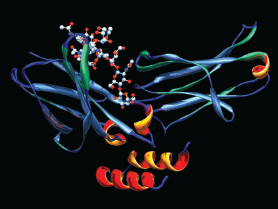
A computer model showing the secondary structure of the drug rituximab. The primary structure of an oligosaccharide (sugar), needed for the biologic activity of proteins, is at the upper left.
Dr. Mark J. Winter / Science Source
Patients with a diagnosis of rheumatoid arthritis (RA) experience on average double the risk of developing malignant lymphoma when compared with the general population. With the major changes in RA treatment taking place over the past decade, has there been a reduction in the risk of lymphoma in this population? Researchers from the Karolinska Institute in Stockholm Sweden set out to answer that question.1
“Given the dramatic changes in RA treatment brought about by the addition of biologic agents over the past 15 years, one could expect the lymphoma risk in contemporary patients to have decreased,” says Karin Hellgren, MD, PhD, from the Rheumatology Unit at Karolinska University Hospital. “However, in a previous report from our group, we still observed a doubling of lymphoma risk.”2
Extending Previous Assessment
They extended their previous assessment in a more recent cohort of RA patients, first diagnosed between 1997 and 2012. The group also looked for potential factors, such as RA characteristics and therapy, that may provide insight into predicting those who are at higher risk of being diagnosed with lymphoma at an early stage of the RA disease course.
“To do this, we took advantage of the unique possibilities offered by the Swedish health, quality and populations registers,” says Dr. Hellgren. “This enables links across different registries through the individual’s national registration number (NRN), which is assigned to all Swedish residents.”
Swedish Registries Gave Unique Information Possibilities

Dr. Hellgren
From the Swedish Rheumatology Quality (SRQ) register, the researchers assembled a cohort of 12,656 incident RA patients diagnosed between 1997 and 2012 with symptom duration less than 12 months between first RA symptom and diagnosis. They then obtained information on RA characteristics at baseline and at subsequent visits, including disease activity during the first year of follow-up.
The SRQ also allowed them to retrieve information on RA treatment with disease-modifying anti-rheumatic drugs (DMARDs) and oral corticosteroids during the first year of follow-up, and treatment with a tumor necrosis factor-alpha inhibitor (TNFi) at any time during follow-up.
From the Swedish population register, they randomly selected 10 population comparator subjects for each RA patient. Through linkage of the entire study population to the Swedish Cancer Register (coverage >95%), the researchers identified all registered cases of lymphoma, including date of diagnosis and subtype of lymphoma.
Results Show 60% Hazard Ratio Increase for Lymphomas
Sixty-two lymphoma cases were found during 79,239 person-years of follow-up. This corresponded to a crude incidence of 78 per 100,000 person-years. In the comparator cohort, 380 lymphomas occurred during 776,578 person-years or a crude incidence of 49 per 100,000 person-years.


